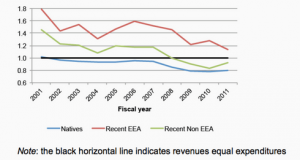RefugeesRefugees can offer economic boost to host countries
Refugees are often considered an economic burden for the countries that take them in, but a new study indicates that refugees receiving aid — especially in the form of cash — can give their host country’s economy a substantial boost. The researchers found that these economic benefits significantly exceeded the amount of the donated aid. The findings come as refugee numbers around the world are growing.

Illustration of the positive impact of migration on public expenditures // Source: theconversation.com
Refugees are often considered an economic burden for the countries that take them in, but a new study conducted by UC Davis with the United Nations World Food Program indicates that refugees receiving aid — especially in the form of cash — can give their host country’s economy a substantial boost.
The researchers found that these economic benefits significantly exceeded the amount of the donated aid.
UC Davis notes that the findings come as refugee numbers around the world are growing. In 2015, an estimated 15.1 million people were displaced from Syria and other locations around the world due to civil conflict or natural disaster, reaching a 20-year high, according to the United Nations High Commission for Refugees.
The new study, published in the Proceedings of the National Academy of Sciences, examined the economic impact of three camps in Rwanda, housing refugees from the Congo. In two of the camps, refugees received aid from the United Nations World Food Program in the form of cash, while in the third camp the refugees received the same value of aid but in donated food.
The researchers used economic modeling methods, based on local surveys, to simulate the impact of the refugees on the host-country economy within a 10 km (6 mile) radius of the three refugee camps. They found that cash aid to the refugees had a greater positive impact on the host nation’s economy than did in-kind food aid.
“The findings of this study run contrary to the popular perception that refugees are helpless and dependent on food aid,” said J. Edward Taylor, the study’s lead author and a UC Davis professor of agricultural and resource economics.
“Our data support recent studies suggesting that although refugees have undergone forced migration and are often living in destitute conditions, they still are productive and can interact with their host country’s economy in positive ways,” Taylor said.
